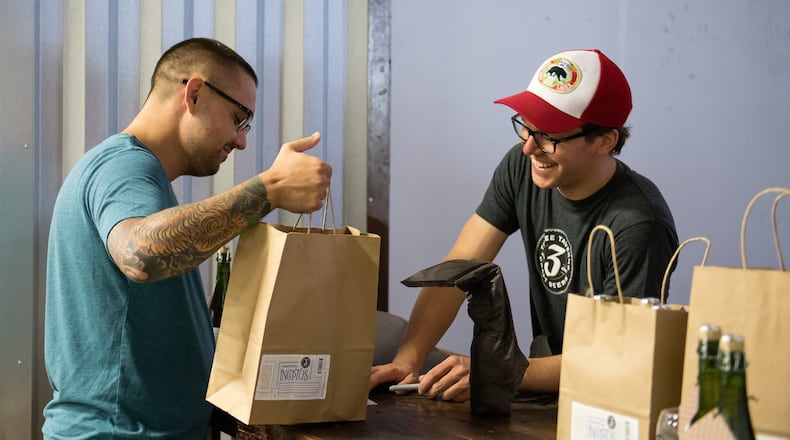Beer deal
The deal among craft beer brewers, liquor distillers and the state’s wholesalers means the Department of Revenue will issue new rules that will:
- Allow brewers again to sell brewery tours at variable prices based on the kind of beer offered.
- Allow special events at breweries and distilleries.
- Let brewers, distilleries and wholesalers use social media to alert the public about where to buy their products or advertise special events.
- Allow third parties to sell tour tickets.
- Let breweries and distilleries sell food on site.
Georgia’s craft beer makers won a major victory Tuesday in a compromise that ends a contentious battle at the Legislature, but not all breweries are celebrating.
Brewers and liquor distillers reached an agreement with the wholesalers and state leaders that allows manufacturers to once again sell tours with variable prices, and for the first time, they can also sell food on-site. The changes will take effect once the Department of Revenue issues new regulations, although the timing of that is unclear.
“An agreement with the governor’s office and legislative leadership for regulatory fixes to the brewing industry has been reached,” said Nancy Palmer, the executive director of the Georgia Craft Brewers Guild. “We look forward to quick implementation.”
If that’s less than effusive, it’s because brewers were hoping for more.
Taylor Lamm, the managing partner and master brewer at Lake Country Brewing Co. in Greensboro, said they hoped lawmakers would help the craft beer industry.
“However, the compromise puts us back exactly where we were in 2015,” Lamm said.
Yes, he said, being allowed to again sell tours with different prices is good, “but Georgia is still significantly behind the rest of the United States.”
“We are losing another year because of this deal,” Lamm said, “and that hurts us a lot.”
Revenue Department spokesman William Gaston could not immediately say how soon the regulation changes will be made.
The department, he said, “is currently reviewing proposed changes to the brewery and distillery tour regulations.”
“Any changes to existing regulations will be published for public comment in accordance with Georgia law,” Gaston said.
Lawmakers last year passed legislation that allowed Georgians to buy a tour of a brewery and receive free beer afterward. Once the law took effect, breweries began offering different tours at different prices based on the kind of beer offered.
Two months later, however, in September, the Revenue Department issued new rules that said the tour price cannot vary based on the beer given away. The brewers were furious and said the agency had succumbed to the wishes of the wholesalers.
Soon afterward, The Atlanta Journal-Constitution reported, Speaker David Ralston, R-Blue Ridge, and Senate President Pro Tem David Shafer, R-Duluth, urged the department to reverse course.
The brewers and distillers then banded together to draft legislation this year that would have sought major changes to the state’s alcohol laws. Tuesday’s deal means that legislation will not be filed.
Martin Smith, a spokesman for the beer wholesalers, said the deal is a victory for all sides.
“We’re thrilled about the compromise and thank our brewer partners and the (Georgia Craft Brewers) Guild for working to make this happen,” Smith said.
Smith said Ralston, Shafer, Lt. Gov. Casey Cagle and Gov. Nathan Deal’s staff were all involved in reaching an agreement.
“We’re in the business of promoting our brewer partners in order to generate success,” Smith said. “The more success the brewers have, the more success everybody has.”
Many brewers, however, are still not convinced.
Many of them were on a conference call with the brewers guild Tuesday afternoon. The organization has discouraged members from commenting publicly on the deal.
On the call, the guild told its members, “This is where we are. We need to fall back,” said Nathan Cowan, the CEO of the Eventide Brewery in Atlanta. “It’s David versus Goliath.”
The wholesalers and the craft brewers have been at odds for years, as the distributors seek to protect the long-standing prohibition that bars alcohol manufacturers from selling directly to consumers.
Georgia is one of the few states in the nation where it is still illegal for drinkers to buy beer at the brewery, either for on-site consumption or to take home.
The prohibitions here are protected by the state’s three-tier system of alcohol sales. Manufacturers can only sell to wholesalers or distributors, and they in turn can only sell to retailers.
Helping preserve that system is the close relationship beer and liquor wholesalers have with lawmakers. The wine and liquor lobby spent $5,500 in June hosting lawmakers at its annual convention on St. Simons Island. Wholesalers have contributed at least $587,000 to state campaigns in the past five years, and individual distributors have given hundreds of thousands of dollars more.
About the Author
Keep Reading
The Latest
Featured




